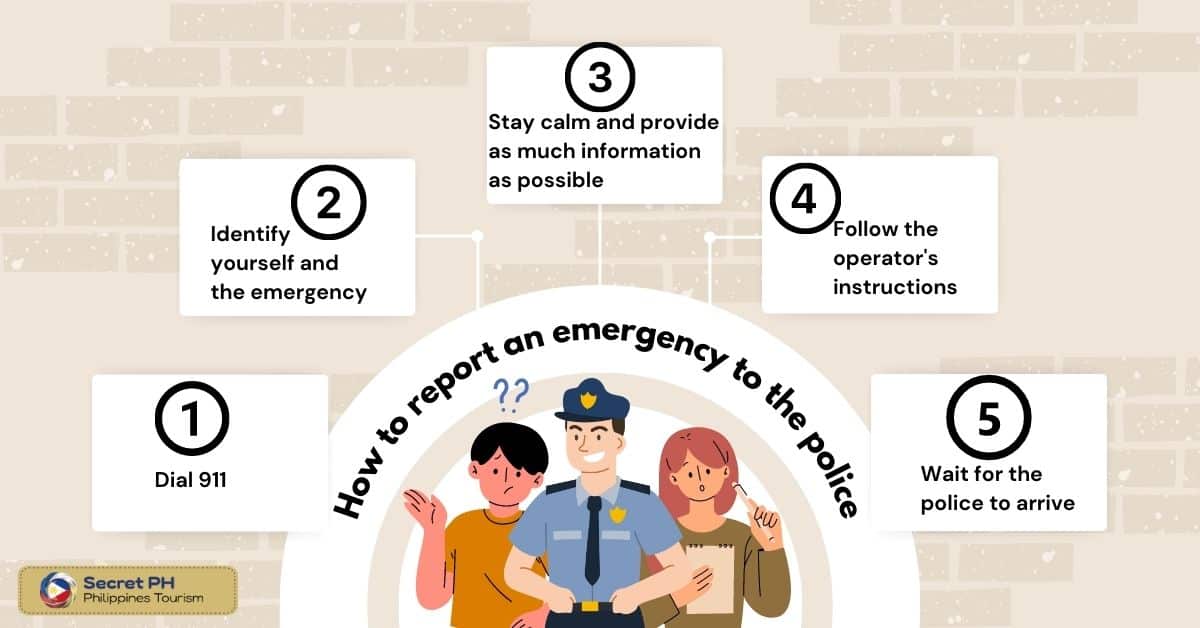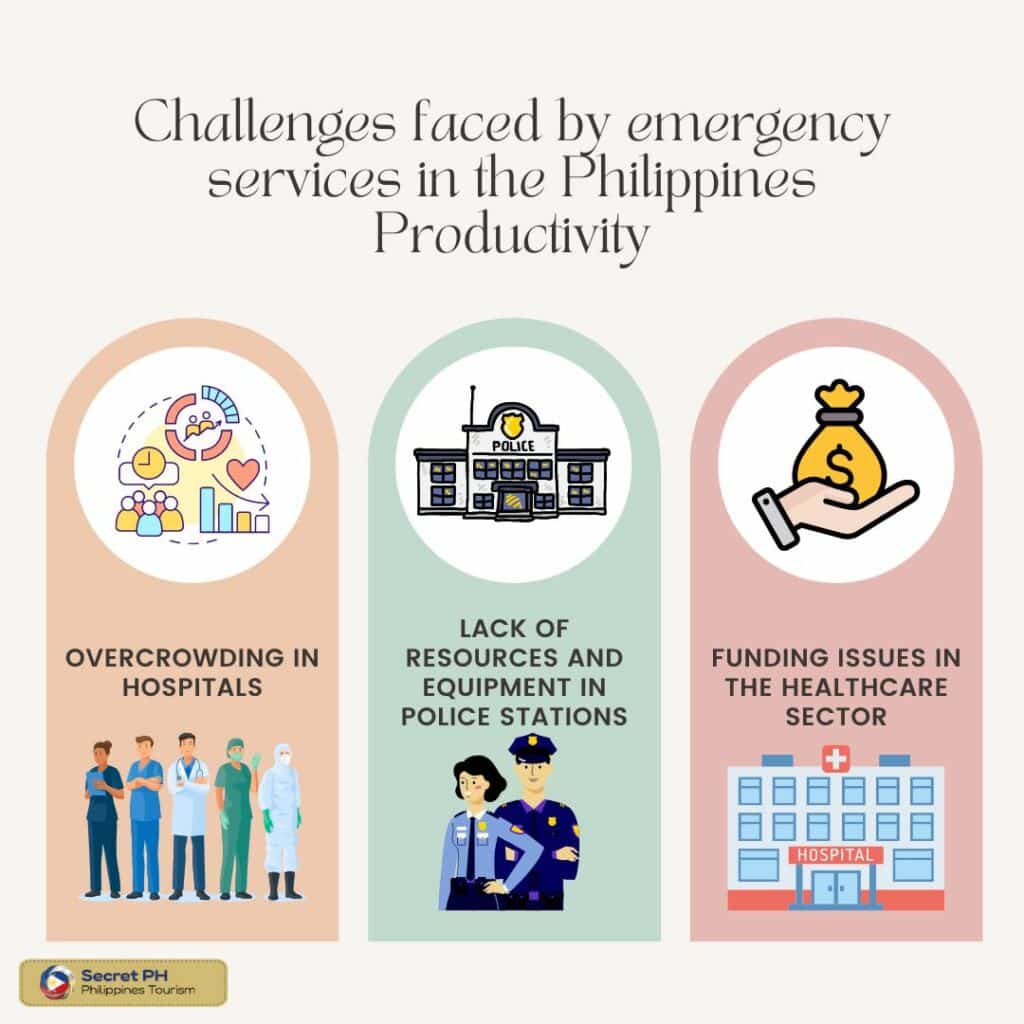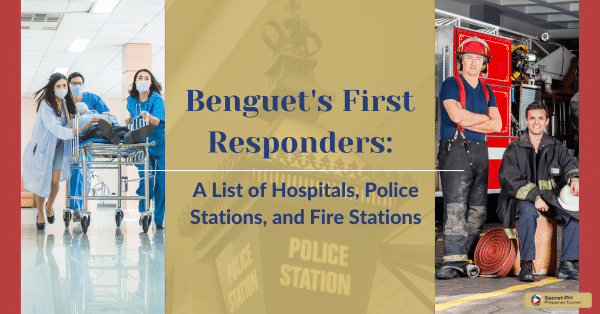The Philippines is equipped with emergency services to ensure the safety and well-being of its citizens. In this article, we will take a closer look at the two primary emergency services in the country: police stations and hospitals. Police stations are responsible for maintaining law and order, while hospitals provide medical assistance during emergencies.
Despite the crucial role they play, these emergency services face challenges such as overcrowding, lack of resources, and funding issues. This article aims to highlight the importance of these services and the need for improvement in the Philippine emergency services sector.

Importance of Emergency Services in the Philippines
The Philippines is a nation that is highly susceptible to natural disasters, including earthquakes, typhoons, and floods. In recent years, emergency responders have come to play an essential role in helping Filipinos prepare for and endure these disasters. Emergency services such as the Philippine Disaster Resilience Foundation provide early warning signals that inform citizens of potential threats, training programs to educate citizens on disaster preparedness measures, and an organized response plan in the event of actual emergencies.
The work of these responders is often invaluable to individuals affected by natural disasters; they help coordinate relief efforts and provide aid that keeps families safe during times of crisis. In addition, emergency responders specialize in identifying and providing medical care to victims who need urgent attention or are injured. Emergency services are thus vital components of the Philippines’ infrastructure, and it is clear why their presence must be acknowledged and appreciated.

Police Stations in the Philippines
Police stations in the Philippines serve as cornerstones of safety and security for the country’s population. Located in almost all cities and towns, police stations are staffed by well-trained officers who work to prevent, detect and investigate crime.
The Philippine National Police is responsible for maintaining public order and providing personal security to citizens throughout the country. Basic services provided by police stations include fingerprinting of documents, registration of permits, handling complaints and issuing other pertinent documents. When it comes to protecting the citizens of the Philippines, police stations remain a crucial institution.
Roles and responsibilities
The Police Stations in the Philippines play an invaluable role in providing safety and security to citizens. From confronting criminal activities to preventing disasters, these police stations provide a range of services.
Besides responding to emergency situations, these officers also take part in community events such as health fairs and awareness campaigns. Apart from patrolling and monitoring the streets, they are responsible for public transport checks, beach patrols, roadside safety checks, and more.

Services offered by police stations
Police stations in the Philippines provide a valuable service to their local communities. They are responsible for upholding law and order, issuing advice, helping people in difficult circumstances, apprehending criminals, carrying out investigations and apprehending fugitives.
Services offered by police stations include patrols of neighborhoods and city streets; responding to emergency calls; providing assistance to victims of crime or accidents; conducting searches for stolen items or contraband items; inspecting vehicles; delivering court papers; and resolving disputes.

How to report an emergency to the police
Reporting an emergency to the police in the Philippines is a straightforward process, but it’s important to know the proper steps to ensure a quick and effective response. Here is a guide on how to report an emergency to the police in the Philippines:

- Dial 911 – This is the official emergency hotline in the Philippines. Dialing 911 will connect you to the nearest police station.
- Identify yourself and the emergency – When you make the call, give your name, location, and a brief description of the emergency.
- Stay calm and provide as much information as possible – Try to stay calm and speak clearly. Provide the police with as much information as possible, including the type of emergency, the location, and the number of people involved.
- Follow the operator’s instructions – The police operator will ask you questions and provide instructions on what to do next. Follow their instructions carefully.
- Wait for the police to arrive – Once you have made the call, wait for the police to arrive. Provide them with additional information if needed.
Hospitals in the Philippines
The Philippines is well-known for its public health care offerings and boasts many world-class hospitals. Accredited by the Department of Health, Philippine hospitals are equipped with state-of-the-art facilities, providing quality services to those who seek medical attention.
Major medical centers are plentiful, while smaller community clinics providing basic health care services can be found throughout the nation. Further advances such as telemedicine and telehealth offer Filipinos access to a greater range of resources, further expanding their health care options. Many uninsured people are also able to access free or low cost health services due to charities and international organizations dedicated to providing medical aid.
The Healthcare System in the Philippines
The healthcare system in The Philippines is underpinned by a network of government and private hospitals, providing care for the nation’s 105 million population. The network consists of: 940 district hospitals, 95 provincial hospitals, 63 tertiary specialty hospitals, 250 infirmary and birthing rooms as well as 615 private medical facilities.
The public sector provides basic health services while the private sector caters to more complex needs such as specialized medicine and surgery. The two sectors operate collaboratively to ensure that all Filipinos have access to quality care close to their homes. The country has achieved a 99% universal health coverage rate partly thanks to the expansive hospital system and its dedication to patient-centered care.

Types of hospitals in the Philippines
The Philippines has a diverse healthcare system that caters to the needs of its citizens. There are several types of hospitals in the Philippines that offer different services and cater to different populations. Some of the most common types of hospitals in the Philippines include:
- Government Hospitals – These are public hospitals that are funded by the government and provide free or low-cost healthcare services to the general public.
- Private Hospitals – These are for-profit hospitals that are owned by individuals or corporations. They offer a range of medical services, including specialty care and surgery, but can be more expensive compared to government hospitals.
- Teaching Hospitals – These are hospitals affiliated with medical schools and are used for the training of healthcare professionals. They usually provide specialized care and are equipped with advanced technology.
- Rural Health Units (RHUs) – These are healthcare facilities that are located in rural areas and provide basic medical services to the local community.
- Specialty Hospitals – These are hospitals that specialize in specific medical conditions or treatments, such as cancer, heart disease, or mental health.
Emergency services offered by hospitals
Hospitals in the Philippines provide a number of emergency services to their patients. Emergency departments are available for those seeking immediate attention for serious or potentially life threatening conditions, and also specialize in medicine, surgery, obstetrics, pediatrics and other specialized services.
Many hospitals have on-call specialists that can be summoned to assist with any medical issue that arises. Furthermore, some hospitals also offer ancillary services such as blood donation, optical examination and diagnostic imaging. The facilities and resources vary between each hospital; however, the quality of service provided by all the hospitals is top notch due to strict adherence to medical standards.

Importance of having health insurance in the Philippines
In the Philippines, having health insurance is of utmost importance due to the limited governmental subsidies and heavy reliance on private hospitals for medical services. Private hospitals are some of the best in Southeast Asia with a high degree of expertise and accessibility.
With technological advances in the medical field and competition among hospitals, there is consistently updated equipment and patient care excellence. Health insurance can help Filipinos obtain their needed health care within these hospitals with ease, allowing them access to immediate treatment when necessary.

Challenges faced by emergency services in the Philippines
Emergency services in the Philippines face a complex mix of challenges. The country’s geography makes it difficult to quickly and efficiently reach all areas in need, as remote and mountainous regions require long trips by road or air. Here are some challenges faced by emergency services in the Philippines:

Overcrowding in hospitals
The emergency services in the Philippines are facing a number of daunting challenges. Overcrowding in hospitals has led to increased wait times, and a lack of resources due to an insufficient number of personnel, combined with the slow-moving bureaucracy has hindered their ability to provide urgent medical care to those who need it. Many staff members leave the country which further exacerbates these problems.
With limited funding and inadequate transportation services, finding help can be difficult for many Filipinos living in rural areas. It is essential that the Filipino government take steps to address these issues such as investing more into their healthcare infrastructure, implementing better training for emergency responders and developing accessible systems for those trying to access medical attention.
Lack of resources and equipment in police stations
Emergency services in the Philippines face immense challenges on a daily basis. Lack of resources and equipment are prominent issues in police stations, making it more difficult for them to respond to public safety incidents. Emergency response times can also be affected by poor infrastructure, which is often a result of underinvestment in roads, bridges and other transportation mechanisms.
It’s not uncommon for emergency services to contend with long journey times when attempting to rescue people or provide medical assistance. Another area that needs improvement is the training of emergency personnel, who might require better guidance and access to new technologies.
Funding issues in the healthcare sector
One of the major challenges faced by emergency services in the Philippines is the inadequate funding in the healthcare sector. This has resulted in gaps within local communities particularly in terms of adequately trained health workers, supplies and facilities to meet the needs of those persons seeking medical attention and other critical services they may require.
Many rural areas continue to lack access to necessary healthcare resources which exacerbates this problem further. On a wider scale, issues such as poor transportation infrastructure have limited access to these services throughout the country. These funding issues present real problems for emergency services as they are often under-equipped and overcrowded with limited capacity to provide assistance when needed.
In Conclusion
The Philippine Emergency Services are complex. Police stations and hospitals provide vital services, but due to inadequate resources and funding they can become overwhelmed during emergencies.
To ensure the health and safety of their communities, it is important for Philippine government bodies to prioritize improving emergency services by allocating better resources and more efficient funds allocation so that Filipino citizens can be better protected from dangerous situations.








